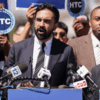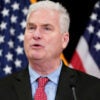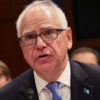
What to do about Libya? First of all, we need to be clear about our national interests. Since we have lived with the Muammar Qadhafi regime for years—and particularly because Libya gave up its weapons of mass destruction program—there is no immediate vital national interest requiring the use of force. That could change. Qadhafi could establish links with terrorist groups that threaten America. He could take Americans hostage or attack our citizens and assets or those of our allies. He could threaten the region’s oil supplies. Any one or a combination of these actions could warrant a military response of some kind.
Of course, the United States has other interests besides security in Libya and the region. In the long run, we would like to see Libya evolve into a more open, free, and democratic society. However, in the short run, especially with a civil war raging, that appears not to be a near-term prospect. Of course, any actions we take now may influence this outcome, but that is not the immediate question on the table. We should not automatically assume that any action we take, no matter how well intentioned, will lead to that outcome.
Instead, we are left with the urgent desire to give the appearance of “doing something.” On that list of tactical actions are whether to impose a no-fly zone or recognize the rebel council, whether to arm and supply the rebels, and whether and how to manage these actions through NATO or the United Nations Security Council.
Imposing a no-fly zone is military action. People would die at the hand of U.S. forces, and it implies a military and political commitment of the U.S. to a certain outcome. It is not a cost-free or easy measure with few risks. The tactical question is whether it would accomplish the advertised goal of concretely aiding the rebels and protecting the civilian population. The answer to that question is “probably not.” But the strategic question—the one that pertains to our vital interest—is whether such an action fits our vital interests.
Right now it does not, mainly because none of the vital interests listed above are directly and adversely affected. But there are too many open tactical questions as well. Is a no-fly zone a tacit recognition of the rebel’s new “Interim Transitional National Council,” which we have not officially recognized yet? If not, could we be giving military backing to a group that may not deserve our backing? Is it intended to signal a military commitment to come to the aid of the rebels and the civilian population if the no-fly zone fails and massacres or military setbacks occur? That is eventually what happened in Iraq and Bosnia. The U.S. and NATO launched massive air and, in the case of Iraq, ground campaigns partly because the no-fly zones were failures. At the very least, we must understand that trying to impose a no-fly zone over Libya could commit us to a similar course.
We should know soon whether the rebel council deserves our recognition. If it does, then we should consider providing supplies and even arms—but only under four conditions:
1. The target of our military support is limited to the Qaddafi regime;
2. The rebels are free of extremist elements and are fully cooperative with us;
3. We rule out supplying arms that could pose a potent threat if they end up in the hands of terrorists (“Stinger” anti-aircraft missiles, for example); and
4. We require the rebel chain of command to take precautions to ensure that the weapons we supplied to them are not sold or diverted to other groups.
The United States is caught in the middle of a geopolitical storm in the Middle East. We are tugged in two opposition directions. One is to show leadership and support the rise of freedom. The other is to avoid the mistakes of the past and to prevent backlashes. True leadership is navigating between these poles and coming out with the right outcome in the end.
Leadership is not posturing or taking seemingly bold decisions that turn out to be failures. The Obama Administration would appear to be exercising caution for the reasons I outline here, but they seem to be more confused than cautious. Torn between a Pentagon reluctant to use force and advisors and politicians counseling immediate action, the Administration looks paralyzed.
And the results are predictably mixed signals. The Administration claims that Qadhafi must go but does not provide the means to that end. It has raised expectations of greater U.S. action at the same time it has balked from that action.
This is the worst of all worlds. People in the Middle East (not to mention Americans) are rightly confused by the mismatch between the Administration’s rhetoric and actions. A wiser strategy would be to not let our condemnation of Qadhafi’s actions box us into specific military actions. But to fill the vacuum of inaction the President has created, he must be loud and clear on what the purpose of the caution is. Right now it looks like confusion, whereas it must be made clear that specific diplomatic and even military preparatory actions are part of a long-term strategy.
The only way to get ahead of this game is to state flatly and repeatedly that America’s primary military goal in Libya is to protect the security of its citizens and its interests in the region. If Americans are harmed or taken hostage, or if terrorists take advantage, or oil supplies are endangered, then we must act. While we cannot rule out categorically that we would not use force for humanitarian purposes, we also need not make that decision now. There are other ways to provide humanitarian relief—such as relying on international organizations or regional NGOs—than rushing U.S. soldiers into no-win danger zones the way we did in Somalia in the 1990s. Instead of embarking on “feel good,” palliative, and possibly ineffective measures like no-fly zones, we should be working hard to find out whether the rebels are people we can work with and, if so, devising a strategy to aid them.
There is no doubt that the removal of Qadhafi and the emergence of a pro-Western regime would be good for America and the world. But frankly, we have no idea at this point that any action we take will lead to that outcome. It’s too early to jump to military conclusions while events on the ground are so uncertain and fluid. If, after the picture becomes clearer and we learn that specific actions—including military ones—will lead to that outcome, then we should consider them.































5 Replies to “A No-Fly Zone over Libya? Take a Deep Breath First”